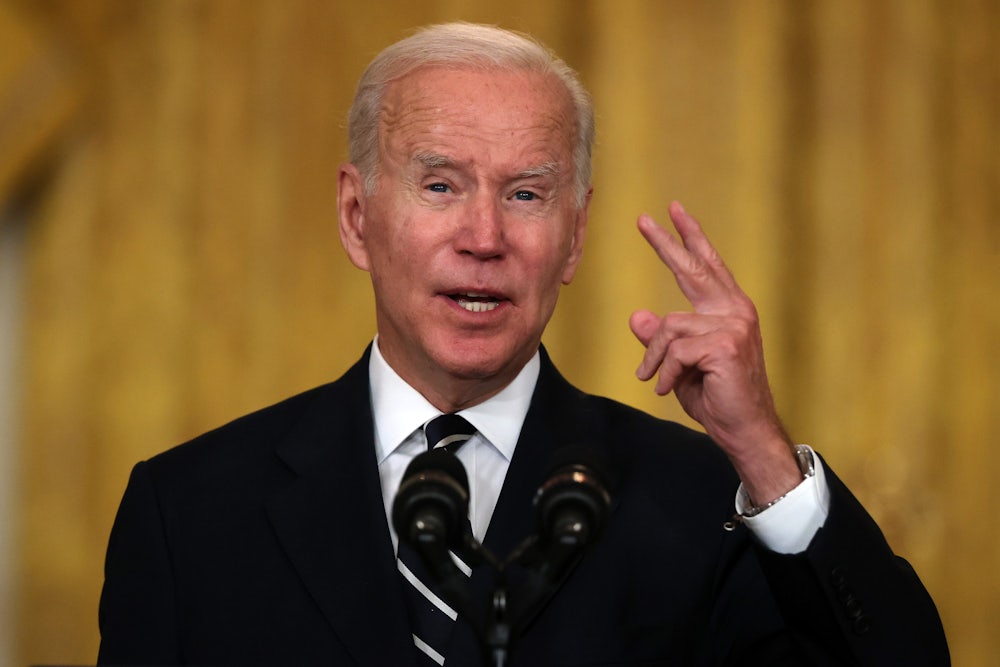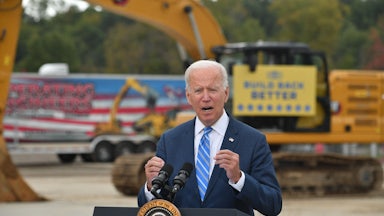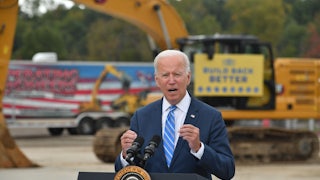Democrats are beginning to shift
their focus from appealing to a party of two moderate senators to trying to
better connect Joe Biden to the popular parts of his infrastructure and public investment bill.
That change in messaging from the White House, allied groups, and in Congress comes as Democrats look to move the Build Back Better Act—the large domestic spending and investment bill they’ve been working on for what feels like years now—through the Senate and onto Biden’s desk. For months, Democrats have argued that passage of that package and the now-signed bipartisan infrastructure bill (commonly shorthanded as “BIF”) is essential to their candidates’ chances in the midterms. They need those proposals signed into law to have something to run on.
But as congressional Democrats passed the infrastructure bill and wrangled with internal party disagreements over the investment bill, the public’s association between the most popular aspects of the package and Democrats has languished, especially with regard to the Build Back Better Act. “I think awareness of the bill is low. We’ve seen that in polling,” Democratic pollster Matt Hogan said of the Build Back Better Act. “Voters are definitely much less aware of it, much less familiar with it, than they are with BIF.”
Part of that is simply because of the legislative sausage-making process that has dominated coverage of Congress for months. Even the bipartisan bill took months of negotiating and at times rancorous debate. That’s still going on with the social spending package—and it’s entirely possible that still more fairly major snags await as the Senate takes up the version the House passed.
“All of us would like this phase to be over with and to be moving on to selling this stuff because at the moment, Democrats are sitting ducks,” explained Matt Bennett, the executive vice president for public affairs at the Third Way think tank. “They can’t talk about the Build Back Better Act—they don’t know what’s going to be in it. They can’t get credit for stuff that isn’t yet done. And yeah, it passed the House, but that isn’t going to be the final bill. Meanwhile Republicans are just going to yell socialism for week after week. So I think one of the problems is that we are fighting with a hand tied behind our back at the moment.”
Elected leaders have fretted that Democrats are just bad at messaging and right now they’re suffering from a severe messaging problem. Polling shows some of the most transformative parts of the public investment bill are popular, as is the bipartisan infrastructure bill. Yet Biden’s poll numbers have flatlined, and Republicans are the heavy favorites to oust many of the lawmakers who voted to move Biden’s domestic policy bills through Congress and are still fighting to do so. Major news outlets have chalked the malaise up to a mixture of lackluster enthusiasm among the Democratic base and a failure by the White House to constantly remind voters that the people behind the popular provisions like prescription drug pricing reforms are Democrats.
White House officials have pushed back on the argument that the Biden administration has mishandled selling its domestic policy agenda to the public. Nevertheless, out of public view, White House officials and senior Democrats have been fielding suggestions on how to “refine their political message.” In private presentations and internal polling, Democrats have been looking for better ways to convince voters that they deserve more support. The White House also regularly has message briefings with various Democratic officials.
Biden himself, as well as surrogates like Transportation Secretary Pete Buttigieg, Energy Secretary Jennifer Granholm, and Vice President Kamala Harris, has been making stops across the country to highlight aspects of the infrastructure bill and convince voters of the urgency of passing the social spending package. Harris and Buttigieg are scheduled to travel to Charlotte, North Carolina, together this week—a possible 2022 battleground state—to promote the infrastructure bill. The trip also helps counter persistent rumors that the Harris and Buttigieg camps are eyeing each other warily in the scenario where Biden is not running for reelection.
On Tuesday morning, the pro-Biden Building Back Together outside advocacy group held a virtual rally featuring Harris and leaders of other prominent liberal-aligned groups like the AFL-CIO and the League of Conservation Voters to urge lawmakers and voters to continue pushing for the more expansive Biden spending bill. The Navigator Research Project, the Democrat-aligned polling outfit, also released new data showing support for various parts of the infrastructure bill.
“I think a thing the administration can do and is beginning to do is really focus on the parts of the [Build Back Better] bill that are the most popular and the most tangible,” said Arkadi Gerney, the executive director and founder of the Hub Project, an initiative that boosts Democratic candidates and causes. “The things that are most popular are the benefits that relate to health care—the ACA, drug pricing, and insulin, along with lowering drug pricing and raising taxes on corporations. All of those things are really popular.”
Increasingly, Democrats are arguing that the best way to sell the package is by highlighting the individual parts. They are also wary about referring to it as a social spending bill. In remarks at the Detroit Economic Club on Monday, Commerce Secretary Gina Raimondo bristled at that description. “I have to admit, I get a little chafed when I see headlines about Biden’s social spending bills,” Raimondo said, according to excerpts of her speech. “These are not social spending bills. These are bills to help Americans get back to work and grow our economy by investing in America’s middle class.”
A veteran Democratic campaign manager and digital strategist put it more bluntly to me earlier that day. “We as a party can’t sell fucking anything,” the strategist said. “And to get away from infrastructure for a sec, we have this other fucking bill that, what’d we call it? A ‘social spending bill’? Jesus fucking Christ! It sounds like a socialist spending bill.”
Jef Pollock, a Democratic pollster, offered a similar sentiment. “I wouldn’t use those words either; why would I say those things?” Pollack said, referring to “social spending bill.” “Why would I talk about it any other way than paid leave for those who need it? I would talk about the individual services. Why does it need a larger brand than that? A social spending bill—nothing could sound bigger as a massive welfare program than a social spending bill. So you’ll never hear me say that, that’s for sure.”
White House talking points shared with The New Republic by a source with access to them focused on the economic benefits of the spending package. The emphasis is on job creation. In other words, the White House wants the package to be thought of primarily as a job creator that won’t add debt anywhere. “The top-line talking points are that it’s fully paid for, that leading rating agencies have confirmed that it will lower costs for families that struggle with prescription drugs, health care premiums, childcare, home care,” a Democrat recited in relaying the talking points. “It’ll help Americans get back to work by providing childcare and care for seniors, create manufacturing jobs, and it cuts taxes for working families.”
Republicans, meanwhile, are doing everything they can to frame it as a costly boondoggle. An email from the Republican Party of Wisconsin had the subject line “Building Back Broke.”
The pollsters I talked with did not say all is lost. There’s still time for Democrats to benefit from the various aspects of Biden’s domestic policy proposals. Biden is also reportedly planning to be more aggressive in attacking Republicans as rabidly opposed to anything he supports.
But time is slipping away. Biden allies and Democrats in general stressed to me that assuming the Senate does pass some version of Build Back Better and doesn’t take until after the Super Bowl to do it, they will have a robust set of domestic proposals to run on in the coming months. Hogan ticked off the various proposals like drug pricing and childcare that are very popular in the yet-unsigned Biden bill. “There’s not a contrast right now, but I do think that does set up a strong contrast for the midterms about which each party [is] fighting for,” Hogan said.
First, though, Democrats need to orient themselves more fully on passing Biden’s domestic policy bills. Otherwise there’s nothing to run on.










